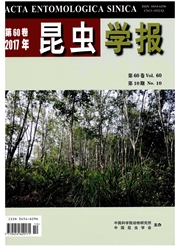

 中文摘要:
中文摘要:
为探明温度对贵州主要产虫茶昆虫紫斑谷螟Pyralis farinalis (Linnaeus)生长发育的影响, 本研究以白茶Litsea coreana为寄主植物, 分别设置5个恒温(19, 22, 25, 28和31℃)条件, 研究温度对紫斑谷螟卵、 幼虫、 蛹和未成熟期平均发育历期、 发育速率和存活率的影响, 计算各虫态发育起点温度和有效积温。 结果表明: 温度对紫斑谷螟各虫态发育历期、 发育速率和存活率影响显著。 在19 ~ 31℃范围内, 各虫态的平均发育历期均随温度的升高而缩短, 卵期、 幼虫期、 蛹期及未成熟期均在31℃达到最小值, 分别为4.56±0.24, 43.33±1.50, 7.89±0.20和55.78±1.69 d。 紫斑谷螟各虫态发育速率与温度呈二次回归关系, 且极显著相关。 此外, 温度显著影响各虫态存活率, 卵的存活率在28℃时最高, 为93%; 幼虫和蛹的存活率则在25℃最高, 分别为88%和93%; 温度过高或过低均不利于其生长发育。 由直接最优法计算得到紫斑谷螟卵期、 幼虫期、 蛹期及未成熟期的发育起点温度分别为13.30, 15.48, 13.19和14.82℃, 有效积温依次为88.36, 679.51, 159.73和952.04日·度。 这些结果为紫斑谷螟的繁殖提供了基础参考数据, 对指导虫茶生产有实用参考价值。
 英文摘要:
英文摘要:
In order to reveal the effects of temperature on the growth and development of Pyralis farinalis (Linnaeus) on host plant Litsea coreana, one insect used for producing insect tea in China, a laboratory experiment was conducted to study the mean developmental duration, developmental rate, and survival rate of P. farinalis at 31, 28, 25, 22 and 19℃. The developmental threshold temperature and effective accumulated temperature of P. farinalis in egg, larval, pupal and immature stages were also calculated. The results showed that temperature had significant effects on the developmental duration, developmental rate and survival rate of P. farinalis. The developmental duration of egg, larva, pupa and immature stage of P. farinalis reduced with increasing temperatures from 19 to 31℃, and was the shortest at 31℃, being 4.56±0.24, 43.33±1.50, 7.89±0.20 and 55.78±1.69 d, respectively. There also existed remarkable significant quadratic regression relationships between the temperature and developmental rates of P. farinalis. In addition, the temperature had significant effects on survival rate of P. farinalis. The survival rate of eggs was the highest at 28℃, being 93%, while those of larvae and pupae were the highest at 25℃, being 88% and 93%, respectively, and excessively high or low temperature was unfavorable to its survival. Based on the direct optimal method, the developmental threshold temperatures of P. farinalis in egg, larval, pupal and immature stages were 13.30, 15.48, 13.19 and 14.82℃, respectively, and the corresponding effective accumulated temperatures were 88.36, 679.51, 159.73 and 952.04 day-degrees, respectively. The results provide a basis for rearing P. farinalis and are applicable in productive practice of insect tea.
 同期刊论文项目
同期刊论文项目
 同项目期刊论文
同项目期刊论文
 期刊信息
期刊信息
